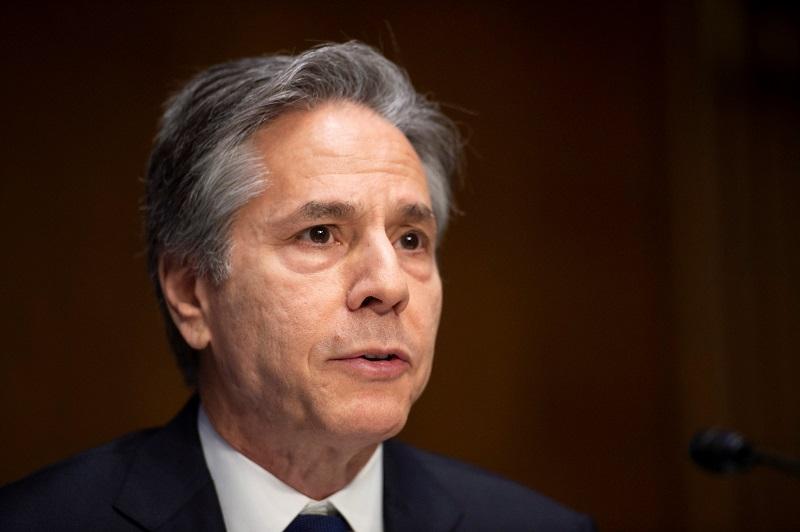US renews commitment to defend Philippines in South China Sea

The Biden administration on Tuesday reaffirmed its commitment to defend the Philippines against any armed attack in the South China Sea and rejected anew China's massive claim on the resource-rich waters.
As the country marks the sixth anniversary of the international arbitral ruling that favored the Philippines and invalidated China's claim, Secretary of State Antony Blinken called on China to stop aggressive and provocative acts in the South China Sea, warning that any attack on the the Philippines will trigger a response from the US.
The Philippines and the US have a 70-year-old defense accord, called the Mutual Defense Treaty, that binds America to defend its Asian ally from aggression.
“The United States reaffirms its July 13, 2020, policy regarding maritime claims in the South China Sea. We also reaffirm that an armed attack on Philippine armed forces, public vessels, or aircraft in the South China Sea would invoke US mutual defense commitments under Article IV of the 1951 US-Philippines Mutual Defense Treaty,” Blinken said in a statement.
The July 13, 2020 policy, referred to by Blinken, is former Secretary of State Mike Pompeo's declaration of support for the 2016 arbitral ruling and regards China's sprawling maritime claims as illegitimate.
“We call again on the PRC to abide by its obligations under international law and cease its provocative behavior. We will continue to work with allies and partners, as well as regional institutions like ASEAN (Association of South East Asian Nations), to protect and preserve the rules-based order,” said Blinken.
On July 12, 2016, the Permanent Court of Arbitration in The Hague, Netherlands delivered a sweeping victory to the Philippines on the case it filed against China in 2013 and declared China's claim over nearly the entire South China Sea as illegal.
China, which called the ruling "ill-founded" and "naturally null and void” does not recognize the legal award and insists indisputable historic rights over nearly the entire waters, which is dotted by clusters of islands, cays, shoals and reefs with rich fishing areas and natural oil and gas.
“Six years ago, an Arbitral Tribunal constituted under the 1982 Law of the Sea Convention delivered a unanimous decision, which is final and binding on the Philippines and the PRC. In its ruling, the Tribunal firmly rejected the PRC’s expansive South China Sea maritime claims as having no basis in international law,” Blinken said.
“The Tribunal also stated that the PRC has no lawful claim to the areas determined by the Arbitral Tribunal to be part of the Philippines’ exclusive economic zone and continental shelf," he added.
Blinken stressed that the US and its Indo-Pacific allies and partners “are committed to preserving a system where goods, ideas, and people flow freely across land, sky, cyberspace, and the open seas.”
Such system, he said, “benefits all countries, big and small.”
“Preserving a free and open South China Sea governed by international law, as reflected in the 1982 Law of the Sea Convention, is part of this shared vision.”
Although not a party to the disputes, the US maintained that keeping the South China Sea — a major trade route — open and accessible is within its national interest.
This year, the State Department released Limits in the Seas No. 150—the latest study in a series examining coastal state maritime claims and their consistency with international law—which concluded that China’s maritime claims “remain plainly inconsistent with international law.”
Challenges
Philippine Ambassador to the US Jose Manuel Romualdez said China and the maritime dispute in the South China Sea remain as the biggest foreign policy challenges for the Philippines amid Beijing’s growing assertiveness.
The Philippines has lodged a series of protests against provocative Chinese actions in the West Philippine Sea, where China blocked Filipino resupply missions and sent 200 of its militia vessels to swarm a reef within the country's waters.
Amid ongoing tensions, Romualdez stressed that the best way forward is still diplomacy, but warned that the Philippines “is prepared to deter aggression.”
“Our foreign and security policies must not only be clear and cohesive, they must also be adaptive and resilient to potential threats, driven by national interests,” he told a forum on the anniversary of the arbitral ruling in Makati City.
President Ferdinand "Bongbong" Marcos Jr. has recognized the significance of the 2016 Arbitral ruling, saying “it is not a claim” but “a territorial right.”
Marcos also vowed that he will “not allow a single square millimeter of our maritime rights to be trampled upon.”
The Marcos administration, Romualdez said, will continue to pursue the military’s modernization to build a more reliable and credible Armed Forces of the Philippines in strengthening the country’s territorial or external defense capability.
Romualdez added that it is crucial for China and the ASEAN to conclude negotiations for a regional code of conduct in the South China Sea.
“All parties or stakeholders must support this process and exercise restraint and cooperation to prevent tensions from escalating further,” he said.
“I continue to hope that contentious issues surrounding the Indo-Pacific would be resolved in a peaceful manner, even as we adopt an independent foreign policy that allows us to engage in mutually beneficial relationships that uphold common strategic interests, based on the recognition that each nation’s sovereignty is indisputable," Romualdez added. —KG, GMA News




